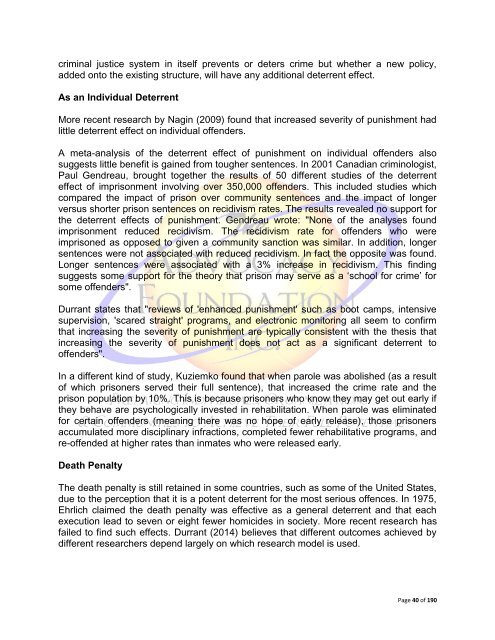The Violent Crime and Law Enforcement Act of 1994
The Violent Crime and Law Enforcement Act of 1994
The Violent Crime and Law Enforcement Act of 1994
You also want an ePaper? Increase the reach of your titles
YUMPU automatically turns print PDFs into web optimized ePapers that Google loves.
criminal justice system in itself prevents or deters crime but whether a new policy,<br />
added onto the existing structure, will have any additional deterrent effect.<br />
As an Individual Deterrent<br />
More recent research by Nagin (2009) found that increased severity <strong>of</strong> punishment had<br />
little deterrent effect on individual <strong>of</strong>fenders.<br />
A meta-analysis <strong>of</strong> the deterrent effect <strong>of</strong> punishment on individual <strong>of</strong>fenders also<br />
suggests little benefit is gained from tougher sentences. In 2001 Canadian criminologist,<br />
Paul Gendreau, brought together the results <strong>of</strong> 50 different studies <strong>of</strong> the deterrent<br />
effect <strong>of</strong> imprisonment involving over 350,000 <strong>of</strong>fenders. This included studies which<br />
compared the impact <strong>of</strong> prison over community sentences <strong>and</strong> the impact <strong>of</strong> longer<br />
versus shorter prison sentences on recidivism rates. <strong>The</strong> results revealed no support for<br />
the deterrent effects <strong>of</strong> punishment. Gendreau wrote: "None <strong>of</strong> the analyses found<br />
imprisonment reduced recidivism. <strong>The</strong> recidivism rate for <strong>of</strong>fenders who were<br />
imprisoned as opposed to given a community sanction was similar. In addition, longer<br />
sentences were not associated with reduced recidivism. In fact the opposite was found.<br />
Longer sentences were associated with a 3% increase in recidivism. This finding<br />
suggests some support for the theory that prison may serve as a ‘school for crime’ for<br />
some <strong>of</strong>fenders".<br />
Durrant states that "reviews <strong>of</strong> 'enhanced punishment' such as boot camps, intensive<br />
supervision, 'scared straight' programs, <strong>and</strong> electronic monitoring all seem to confirm<br />
that increasing the severity <strong>of</strong> punishment are typically consistent with the thesis that<br />
increasing the severity <strong>of</strong> punishment does not act as a significant deterrent to<br />
<strong>of</strong>fenders".<br />
In a different kind <strong>of</strong> study, Kuziemko found that when parole was abolished (as a result<br />
<strong>of</strong> which prisoners served their full sentence), that increased the crime rate <strong>and</strong> the<br />
prison population by 10%. This is because prisoners who know they may get out early if<br />
they behave are psychologically invested in rehabilitation. When parole was eliminated<br />
for certain <strong>of</strong>fenders (meaning there was no hope <strong>of</strong> early release), those prisoners<br />
accumulated more disciplinary infractions, completed fewer rehabilitative programs, <strong>and</strong><br />
re-<strong>of</strong>fended at higher rates than inmates who were released early.<br />
Death Penalty<br />
<strong>The</strong> death penalty is still retained in some countries, such as some <strong>of</strong> the United States,<br />
due to the perception that it is a potent deterrent for the most serious <strong>of</strong>fences. In 1975,<br />
Ehrlich claimed the death penalty was effective as a general deterrent <strong>and</strong> that each<br />
execution lead to seven or eight fewer homicides in society. More recent research has<br />
failed to find such effects. Durrant (2014) believes that different outcomes achieved by<br />
different researchers depend largely on which research model is used.<br />
Page 40 <strong>of</strong> 190
















